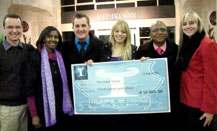 |
Attending Imperium Residence’s academic evening was, from left: Dr Scarpa Schoeman, Residence Head of Veritas, Dr Mpho Moagi-Jama, Residence Head of Imperium; Michael van Niekerk, Primarius of Imperium; Monique Visser; Mr Pura Mgolombane, Assistant Dean of Student Life and Leadership; and Monique Janse van Rensburg, a former primaria of Imperium.
Photo: Amanda Tongha
17 August 2012
|
The city residence Imperium, previously known as Medix, honoured its academic performers during the residence’s annual academic evening, which was held on Thursday 16 August 2012. Certificates were handed out to the residence’s top first-year and senior students.
A bursary of R10 000 was also handed over to a student. The money was collected by the students themselves. Monique Visser, a first-year medical student, who was among the top ten matriculants in the Western Cape in 2011, received the bursary. Monique was also named the second best student in her year group.
Michael van Niekerk, Primarius of Imperium and the best third-year student, praised Monique for her hard work and said it was good to give back to students.
Dr. Mpho Moagi-Jama, the residence head of Imperium, praised her students and said they must continue being outstanding.
Imperium, which underwent a name change recently, is open to male and female students in all fields of study.